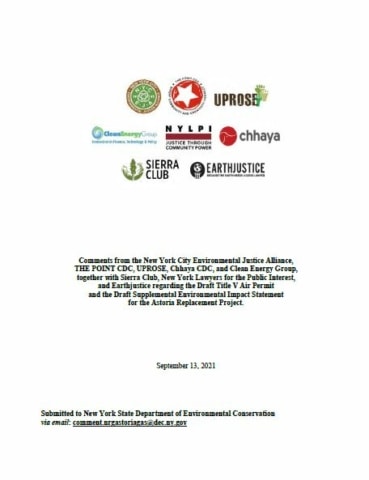PEAK Coalition et al Comments on New York City Astoria Gas Plant Replacement
September 14, 2021
Clean Energy Group, New York Lawyers for the Public Interest, NYC Environmental Justice Alliance, THE POINT CDC, UPROSE, Cchaya CDC, Earthjustice, Sierra Club | The PEAK Coalition
These comments explain how the proposed Astoria Gas Plant replacement project proposed by NRG in New York City is inconsistent with New York’s Climate Leadership and Community Protection Act (CLCPA) emissions reduction mandates. The comments were drafted in response to the issuance of a Draft Title V Air Permit and a Draft Environmental Impact Statement. They were prepared by Earthjustice and New York Lawyers for the Public Interest (NYLPI) on behalf of the PEAK Coalition (New York City Environmental Justice Alliance, THE POINT CDC, UPROSE, NYLPI, and Clean Energy Group) and Chhaya CDC together with Sierra Club, and submitted to the New York State Department of Environmental Conservation (DEC). Clean Energy Group contributed to many of the technical aspects of the comments, particularly those related to battery storage alternatives and the proposed transition to hydrogen combustion.
They petition DEC to deny the air permit because the emissions from the plant will interfere with New York’s attainment of its greenhouse gas (GHG) emissions limits, and it is therefore inconsistent with the CLCPA. Further, project developer NRG has not set forth a justification for the plant or any GHG mitigation measure sufficient to allow approval despite the inconsistency.
The parties challenge NRG’s modeling and demonstrate that the proposed gas plant is not needed to support increased integration of renewables nor is it needed as a black start resource. They further find that the proposed gas plant will disproportionately impact disadvantaged and overburdened communities in violation of the CLCPA. The parties support these claims with technical analysis by Synapse Energy Economics, Inc., Applied Economics Clinic, and Geospex LLC.
The parties also challenge NRG’s claims that the proposed plant can avoid becoming a stranded asset by switching to hydrogen or renewable natural gas (RNG) as a fuel in the future. They note that pure hydrogen combustion is not possible with the proposed technology and that hydrogen blending will only achieve modest CO2 reductions while increasing NOx emissions, and therefore this proposed future scenario is also inconsistent with the CLCPA. And RNG combustion is not emissions-free and is also inconsistent with the CLCPA.
The PEAK Coalition et al demonstrate that current offshore wind and transmission investments, combined with battery storage and demand response, are clean, appropriate and reliable alternatives to the proposed Astoria gas plant.





